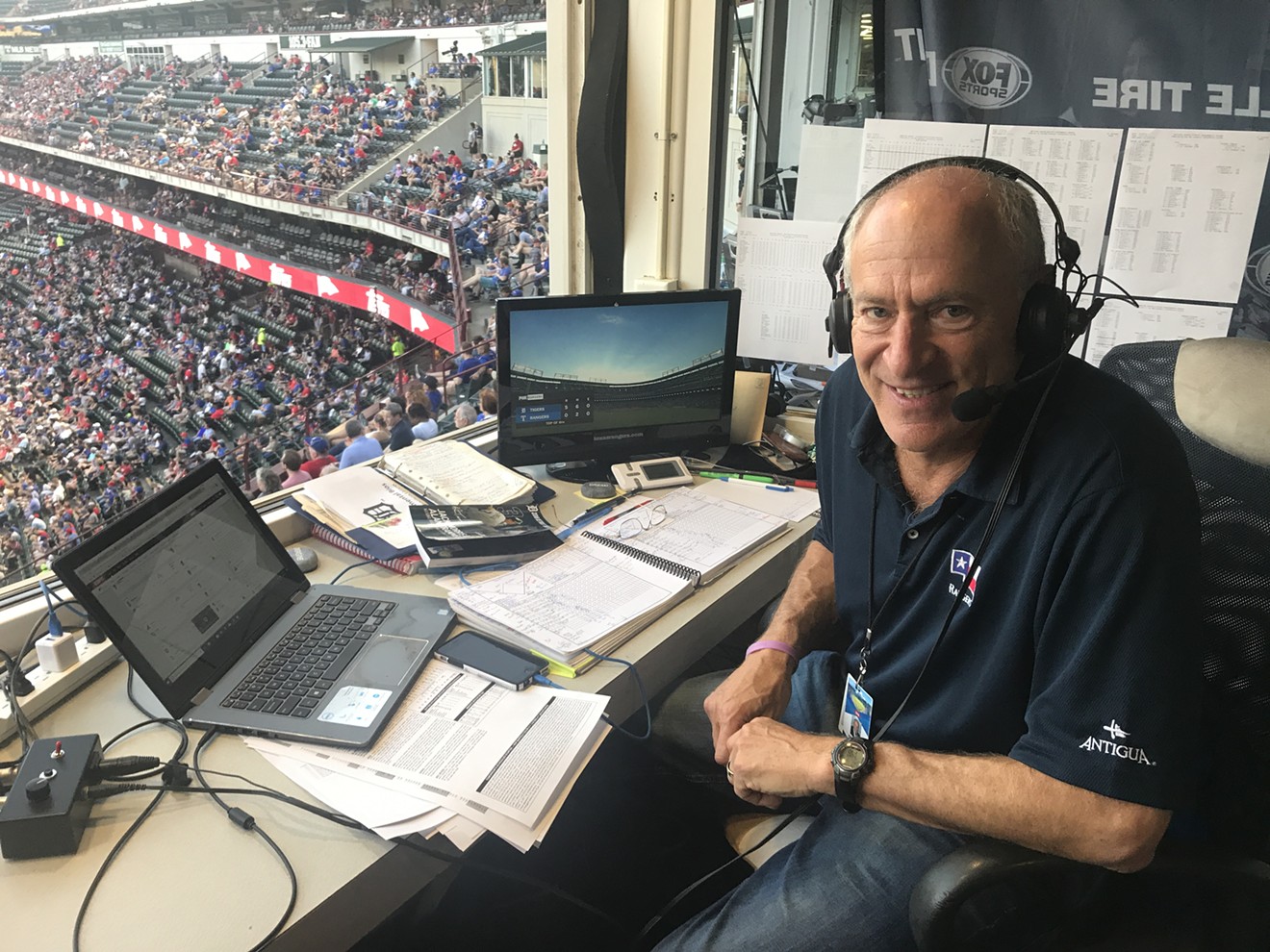Eric Nadel was aware of mental illness from an early age.
His mother volunteered for an organization for emotionally disturbed children, and his family has a history with depression and anxiety.
“I became very aware at a really early age that that sort of problem was very prevalent,” says Nadel, the Texas Rangers play-by-play radio broadcaster. He’s sitting in Globe Life Park’s press cafeteria, sipping his green tea about two hours ahead of game time. “It's really important to me to maintain my own mental health, as well as trying to make others aware that you know it's important.”
Nadel made his mental health a priority in 2013 when, for the first time in nearly 40 years, he began taking games off.
The thought of not working, not calling a game, not being in the radio booth, stressed him out. What if he missed a no-hitter? A perfect game?
The first time he considered taking a game off was in 2007. It was the end of an away series in late August. The Rangers were playing a doubleheader in Baltimore against the Orioles. Nadel was exhausted. He would have to wake up at 5 a.m. the next morning, only to do it all over again in Arlington in 100-degree heat.
“And then I just thought, '"No, what if something incredible happens tonight?'” he says. “And that was the night the Rangers scored 30 runs. Major League record. If I had taken that game off, I wouldn't have gotten to call that game.”
But the Cincinnati Reds radio broadcaster Marty Brennaman kept pressuring Nadel to take a vacation."If I had taken that game off, I wouldn't have gotten to call that game.” – Eric Nadel
tweet this
In 2013, Nadel and his wife planned a trip to Alaska. And he missed a four-game series near the All-Star break.
“And somehow they played the games without me,” he says. “And the broadcast got done. In fact now, you know with the MLB At Bat app, I was able to listen to as much of the games as I wanted to.”
Now he takes about 20 games off, with that number going up each season. The time off helps prevent burnout.
“At the end of the season, the last month of the season, I used to be really tired, mentally tired," he says. "And I'm not anymore because I've taken the games off along the way. Most of the games I take off are in the second half — when I really need 'em — especially in a season where the Rangers aren't good and it's starting to wear you down a little bit. The job's much harder when they're not good.”
Nadel isn’t just concerned about his mental health. When his wife used to volunteer for Contact, a crisis and suicide hotline, Nadel dedicated his birthday party to a benefit concert to help Contact receive name recognition and funds. When Contact folded, he switched the concert’s focus to Focus on Teens, an organization for homeless teens who attend Dallas Independent School District.
“We kind of kept it in the same area because the risk of mental health issues for the homeless is astronomically high,” he says. “These kids are sleeping on couches or in cars or in fleabag motels and then going to school the next day. And this organization is giving them a safe place to go for a couple of hours before school. Giving them whatever they need, school supplies, use of a computer, clothes, food, counseling if they need it. We gotta help these guys.”
A 16-year-old Alex Rodriguez bobblehead is whitewashed from the sun flooding into the radio booth. The Rangers Hall of Fame broadcaster pores over his binders of handwritten notes.
A listener has emailed Nadel inquiring about Rangers infielder Isiah Kiner-Falefa’s name pronunciation. When Nadel says the fan’s name out loud, everyone in the booth is familiar with him. Nadel says the fan emails him any time he has an on-air grammatical error. Nadel ends a sentence with a preposition? An email. Nadel says “Me and Hicks?” An email.
But Nadel isn’t bothered by it.
“At least he’s listening,” he says.
A few minutes later after looking through the game-day notes, Nadel announces a scoring change.“At least he’s listening." – Eric Nadel
tweet this
“We had a scoring change April 28 in Toronto,” Nadel announces to the booth. “Did you see that?”
Matt Hicks, Nadel’s other half in the radio booth, lets out a long “noooooo.”
“Let me guess,” Hicks says. “Shin-Soo Choo does not get a two-run double.”
“Correct,” Nadel says. It was an error on the centerfielder, and together, Nadel and Hicks figure out Choo’s new stats, the centerfielder’s new stats and the pitcher’s new stats. Hours later, Nadel effortlessly includes that tidbit when Choo steps up to bat.
It’s all easy for Nadel. In fact, he thinks television broadcasting is hard. When there’s nothing to say, at least he can describe. When Nadel is on air, he describes everything in great detail. The weather. The uniforms. The shortstop's dive. The pitcher's wind-up.
"(Mike) Minor in short sleeves on this warm day," Nadel says on air. "He's showing a few inches of blue T-shirt sleeve extending down to about the elbows. Works way off on the third base side of the rubber."
Each time the Rangers were short a TV broadcaster, the team offered Nadel the gig, he says, and during his first three years, he would switch between radio and TV — three innings on radio, three on TV.
“I don't like TV because the real fun of this job is describing things,” Nadel says. “And on TV you don't describe anything; people can see it. I've always been good at describing. I've been good with words and always read a lot as a kid, and I always listened to a lot of radio. ... I loved hearing the way announcers described things.”
He’s the voice of hope. He gave himself that slogan, and it was put to the test May 8, when the Rangers fell behind, 5-0, to the Tigers in the first three innings.
Sometimes Nadel has to remind himself of that slogan. Before that day's game, the Rangers were 14-23. He says if and when the record gets worse, he won’t mention it. Fans don’t need to be reminded.
“The team was playing badly, it was a bad year and I was getting too negative. We get worn down. You know we're the biggest Rangers fans there are.” – Eric Nadel
tweet this
In 2014, the National Baseball Hall of Fame honored Nadel with the Ford C. Frick Award, and he joined the ranks of two of his idols: New York Mets radio announcers Lindsey Nelson and Bob Murphy.
“I grew up listening to the New York Mets,” Nadel says. “In 1962, I was 11 years old. And that's the first year that I remember, like, religiously listening to every game. The Mets that year set an all-time record for losses. They were 40 and 120. Can you imagine that? They won one [of] every four games.
"But their announcers, Lindsey Nelson and Bob Murphy, who are both in the Hall of Fame now, made it sound every day like they had a chance to win. Like their players were enormously talented.”
Jon Shestakofsky, the vice president of communications and education for the National Baseball Hall of Fame, says a 20-member electorate of living Frick Award recipients and broadcast historians and columnists selected Nadel for the award.
"Eric Nadel’s voice is synonymous with Texas Rangers baseball," Shestakofsky says. "In his four decades behind the microphone, Eric has described many of the franchise’s greatest moments to multiple generations of fans, all with an infectious and undeniable enthusiasm."
When the enthusiasm fades and the negativity starts to creep in, Nadel is reminded of Nelson and Murphy. And he remembers the time Kevin Brown, a Rangers pitcher in the '80s, called the radio booth from the clubhouse. Brown didn’t like the way Nadel described outfielder David Hulse’s attempted catch.
“Basically the guy missed it by five feet, and he turned a single into a triple and the phrase I used was, ‘He gambled and lost,’” Nadel recalls.
When Nadel finally picked up the phone after the inning ended, Brown wasn’t pleased.
“He said, ‘Can you possibly be more negative?’ I said, ‘What do you mean?’ He said, ‘The way you described that incredible effort by David Hulse. You should've been talking about how he laid out his body and was willing to sacrifice for the team and all that. And instead you said he gambled and lost.’”
Brown’s commentary on Nadel’s commentary didn’t piss off Nadel, though. Instead, it gave him a nice reminder.
“The team was playing badly, it was a bad year and I was getting too negative,” Nadel says. “We get worn down. You know we're the biggest Rangers fans there are.”











